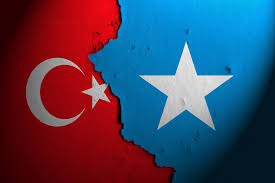 Hadhwanaagtv
Hadhwanaagtv
As President Recep Tayyip Erdoğan of Turkey is set for his momentous and poignant return to Mogadishu in the coming weeks, much has changed for the better in Somalia because of Turkey’s involvement and belief in Somalia’s potential. During President Erdogan’s last visit in 2011, Somalia was a forgotten and miserable corner of Africa. Today, Somalia is at the cusp of becoming an oil-producing African nation, joining the likes of Angola, Mozambique and Equatorial Guinea.
Since 2011, Turkey under President Erdogan has continued to make multi-sector investments, now totally billions of dollars, to rebuild Somalia’s economy, infrastructure and security sector. When Western and Gulf Arab nations completely abandoned and ignored Somalia’s plight, Turkey- which have deep historic ties to Somalia and the wider Horn of Africa from the Ottoman period, stepped with direct humanitarian assistance, diplomatic support, governance training, budgetary support to the Somali government, and political mediation with Somaliland.
In 2012, President Erdogan personally lobbied the US government of President Barrack Obama to formally recognize the Somali Transitional Government of Sharif Ahmed, as well as to end the diplomatic and international marginalization of Somalia.
President Erdogan presented a New Vision for a united and prosperous Somalia to the Council of European States, US, China and Gulf Arab States. He spoke directly to the United Nations Security Council members. Consequently, President Erdogan urged the world powers to adopt a comprehensive plan to revive the Somali state institutions and allow for genuine talks between Somaliland and Somalia away from their myopic interests. Not many Somali citizens, except perhaps a few insiders, know the great extent to which Turkey and President Erdogan personally endeavored to convince sceptic world powers to give Somalia a second chance.
Not waiting for the US and European powers to reconsider their decades of apathy and disinterest in Somalia, Turkey after 2011 went ahead with a large scale reconstruction programme beginning with rebuilding Mogadishu international airport, seaport, hospitals and roads. To show the world its long-term commitment to resolving Somalia’s plight, Turkey sent in its national airline carriers, Turkish Airlines, as well as established its largest embassy in Mogadishu, known at the time as the most dangerous city in the world!
When the United Nations under Secretary-General Ban Ki-moon refused to authorized a UN reassessment of Somalia, especially to support Turkish efforts to initiate Somalia-Somaliland talks and establish a joint commission, Turkey went ahead with establishing the TURKSOM security assistance programme training hundreds of Somali citizens from all over the country, including Somaliland, to be able to defend their nation-state and its resources.
For 14 years, President Erdogan made it clear that he intends to successfully re-integrate a united Somalia back to the international community of sovereign nations along the way making the required sacrifices and investments for this objective.
Today, Turkey’s undeniable successes in Somalia has resulted in it becoming by the far the most strategically positioned nation to gain from the offshore hydrocarbons off the Galmudug coast to establishing in Somalia Africa’s first facility to launch rockets and satellites. Crucially, President Erdogan and Turkey have won over the hearts and loyalty of the Somali population.
In this respect, knowing how successful President Erdogan’s lobbying and sheer determination to revive Somalia has been over the years— just recently successfully resolving the Ethiopia-Somalia maritime dispute with the recognition of Somali sovereignty by Ethiopian Prime Minister Abiy Ahmed, I urge the Savior of Somalia, President Erdogan of Turkey to now promote a rotational presidency to bring Somaliland and Somalia back together in 2025.
In a rotational presidency such as in Bosnia-Herzegovina (which can serve as a model), Somalia and Somaliland leadership can share in the executive branch of governance. This will actually help the democratization of the political process, guarantee autonomy of Somaliland, and have a cultural change in Somali politics away from clan divisions since presidential candidates will need to appeal to both the North and South constituencies knowing political power will not be concentrated in the hands of either Hargeisa or Mogadishu permanently.
Moreover, a rotational presidency enshrined in a new Constitution whether that is in 2025 or afterwards will allow time for the needed reconciliation, trust-building and pacification of the country to allow for a census and direct election. There is no practical alternative to resolving the Somaliland-Somalia impasse apart from a rotational presidency given the prevailing conditions. It is time for Somalis and the world to accept this fact: only through negotiation and specifically a rotational presidency is Somaliland returning to Somalia.
Therefore, President Erdogan while in Mogadishu should convene the Somali federal leadership to adopt a roadmap for a rotational presidency to unite Somaliland and Somalia with particulars left to a broad spectrum of Somali scholars, traditional clan elders, civil society representatives to resolve such key issues as clan political representation, reparations for the human rights abuses of the dictatorial Siad Barre regime, national reconciliation and so forth.
By Dr. M. Omar Hashi
Hadhwanaagnews marnaba masuul kama aha Aragtida dadka kale. Qoraaga ayaa xumaanteeda, xushmadeeda iyo xilkeeda sida. waxa kaliya oo Hadhwanaagmedia dhiirigalinaysaa, isdhaafsiga aragtida, canaanta gacaliyo talo wadaagga!